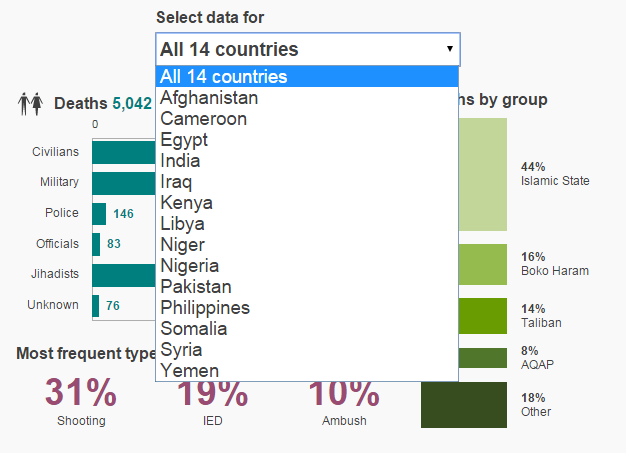At the beginning of November 2016 the BBC World Service radio programme “On Background” ran an episode that included an item supposedly about antisemitism in Europe. As was noted here at the time:
“The item begins with Kevin Connolly revisiting the May 2014 shooting at the Jewish Museum in Brussels in which an Israeli couple, a French woman and a Belgian man were murdered. Notably – in light of the BBC’s record – the incident is accurately described on two occasions as a “terrorist attack”. However, the identity of the suspected attacker and his apparent Islamist motives are not mentioned at all in Connolly’s report.
Given the chosen starting point of the attack on the Jewish museum in Brussels, listeners familiar with its background would perhaps have been rather surprised by the item’s focus on the unrelated topic of Christian antisemitism in Europe.”
For no obviously apparent reason, that report by Connolly was recycled four months later in the February 26th edition of the BBC Radio 4 programme ‘Broadcasting House’ which describes itself as discussing “the big stories of the week”.
In the programme’s introduction listeners were told:
“Nearly three years on, we go back to the Jewish Museum in Brussels where four people were killed in a terror attack.”
They then heard a voice say:
“Today not only the Jew are afraid; everybody is afraid. Terrorism can attack everybody and today we have to help everybody to protect our society.”
Presenter Jane Garvey introduced the item itself (from 37:25 here) as follows:
“On the 24th of May 2014 a lone gunman walked into the Jewish Museum in the Belgian capital, Brussels, and opened fire. Four people were killed. The chief suspect was arrested in France and extradited back to Belgium. Kevin Connolly has been looking back at the impact of this attack on the museum, which reopened in the autumn of 2014.”
After the sound of archive recordings of news bulletins concerning the attack, Kevin Connolly opened his somewhat amateurishly edited report. [emphasis in italics in the original, emphasis in bold added]
Connolly: “We remember the scenes of terrorist attack like the Jewish Museum in Brussels just as they were at the moment when it all happened: intense and frozen like a flash photograph. For most of us, the sounds of daily life quickly surge back into the familiar streets and squares and wash away the horror. For the characters in the story though, at such a moment everything changes for ever. That’s how it feels now in the elegant streets and squares near the Jewish museum in Brussels where the cafés and antique shops are of course busy again two years after a lone attacker wandered in off the streets and opened fire.”
Listeners then heard a voice later identified as the museum’s director briefly telling how he was informed of the attack before Connolly went on to repeat a sentence heard only seconds earlier.
Connolly: “For the characters in the story though, at such a moment everything changes forever. Not just the dead and those who loved them but men like Philippe Blondin, the museum’s director who’d always believed that the absence of heavy security at the building sent a signal not of vulnerability but of openness.”
Connolly went on to interview the director of a Jewish community centre in Brussels, emphasising the employment of heavy security measures.
Connolly: “After every act of violence that makes the news and then fades from it, shock waves ripple outwards. At this Jewish community centre not far from the museum in Brussels there are soldiers on guard at the main entrance these days, double door entry systems, document checks and private guards inside.”
Connolly also spoke to another member of the community.
Connolly: “Philippe Markovitch [phonetic] – a lawyer and another leader of Belgium’s Jewish minority has thought deeply about the lessons of the attack on the Jewish museum too. He emphasises that this is not simply European history repeating itself; that in its modern form antisemitism is the prejudice of a minority – not the policy of a state – but that these days Jews are not alone in their vulnerability to terrorist attack.”
Connolly then told the story of how the Jewish museum’s director hid as a small child in Nazi-occupied France before telling listeners that:
Connolly: “Philippe believes that families like his that lived through the Holocaust in Europe had a tremendous joy and energy about them in the post-war years. And he applies in modern Brussels a lesson he learned in the Europe of the past: that the best response to adversity is to keep alive a sense of purpose.”
Connolly closed the item thus:
Connolly: “The Brussels attack has naturally faded from the headlines of course and from the streets of Sablon too but there are those whose lives it touched who still live with it every day and there are lessons it has to teach the rest of us – if we’re prepared to listen.”
Exactly what those “lessons” are supposed to be is unclear from Connolly’s cryptic commentary. However, one topic he and the BBC appear to be serially keen to avoid is the identity, ideology and motives of the terrorist who murdered four people at the Jewish Museum in Brussels, together with any serious discussion of the issue of contemporary Islamist antisemitism in Europe or examination of the question of why Jewish institutions and establishments such as the community centre he visited need to employ security measures that other groups in European society thankfully do not require.
Related Articles:
BBC’s director of news discusses antisemitism – up to a point




